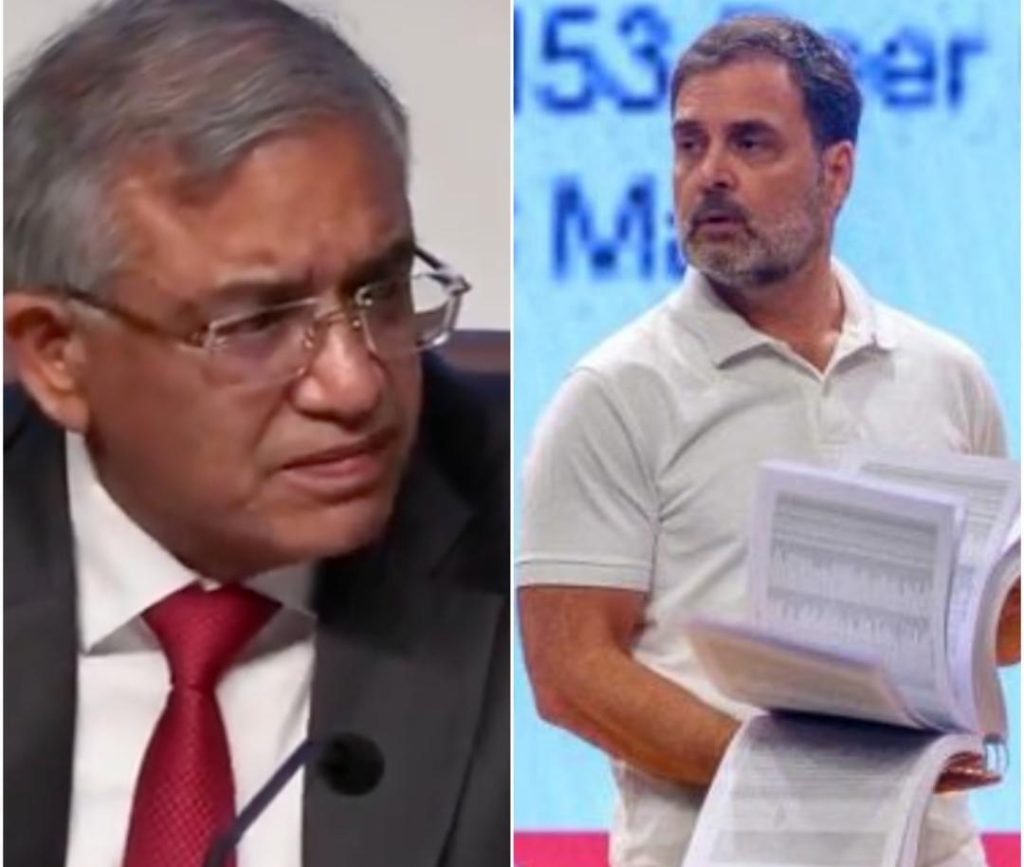
Vote Chori’ Phrase an Insult; Should We Share CCTV Footage of Mothers & Sisters Voting?: EC
The ongoing general elections in India have been marred by controversies, with political leaders making inflammatory statements and allegations of rigging. One such phrase that has sparked outrage is “vote chori” (vote theft), used by Congress leader Rahul Gandhi to claim that elections are being rigged. The Chief Election Commissioner (CEC), Gyanesh Kumar, has strongly criticized this phrase, calling it an insult to the Constitution. In a recent statement, he also raised concerns about releasing surveillance footage from polling booths, asking whether the Election Commission should share CCTV videos of any voter, including their mothers and sisters.
The “vote chori” phrase has been widely used by Rahul Gandhi and his party members to claim that the BJP is indulging in electoral malpractices. However, the CEC has deemed this phrase an insult to the Constitution, emphasizing that the Election Commission takes every possible measure to ensure free and fair elections. Kumar pointed out that the Commission has already taken several steps to prevent rigging, including introducing advanced technology and increasing the number of polling booths.
Kumar’s criticism of the “vote chori” phrase is not just about the language used, but also about the attempt to undermine the integrity of the electoral process. He emphasized that the Commission is committed to ensuring the sanctity of the vote and that every vote counts. The CEC’s statement is a strong rebuke to those who seek to discredit the democratic process and create doubts about the legitimacy of the elections.
The controversy surrounding the release of surveillance footage from polling booths adds another layer of complexity to the issue. The Election Commission has been criticized for not releasing CCTV footage of alleged voting irregularities, with some demanding that the footage be made public. However, Kumar has cited voter privacy concerns as a major reason for not releasing the footage. He asked whether the Commission should share CCTV videos of any voter, including their mothers, daughters-in-law, and other family members.
Kumar’s question highlights the sensitivity of the issue. While some may argue that releasing CCTV footage would increase transparency and accountability, others may point out that it could compromise the privacy of voters. The CEC’s concerns are valid, given that the Election Commission is responsible for protecting the personal data of voters.
The debate surrounding the release of CCTV footage also raises questions about the role of technology in elections. The Election Commission has been investing heavily in technology to improve the electoral process, including the use of electronic voting machines and voter-verified paper audit trails. However, the controversy surrounding the release of CCTV footage highlights the need for a nuanced approach to technology in elections.
In conclusion, the “vote chori” phrase is an insult to the Constitution and undermines the integrity of the electoral process. While the CEC’s criticism of the phrase is well-deserved, the controversy surrounding the release of CCTV footage highlights the complexity of the issue. The Election Commission must strike a balance between ensuring transparency and accountability, while also protecting the privacy of voters.
As the country heads towards the next phase of general elections, it is essential for political leaders to refrain from making inflammatory statements and allegations of rigging. Instead, they should focus on building a robust and transparent electoral system that ensures the sanctity of the vote. The Election Commission, on its part, must continue to take every possible measure to ensure free and fair elections, while also addressing concerns about voter privacy and the role of technology in elections.






